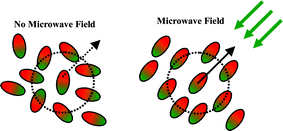Can “microwave effects” be explained by enhanced diffusion?
Abstract
The “microwave effect” or non-thermal effects due to microwaves have been the subject of intense debate. This paper explores the following hypothesis: if the transport of an active species is a rate limiting step in a reaction, and if microwaves enhance the diffusion of that species, then the overall reaction rate would change under microwave heating compared with conventional heating. If the hypothesis is correct then it should be possible to pick those reactions that would speed up, slow down or stay the same, under microwave irradiation. One consequence of the hypothesis is that the equilibrium states (end point of the reactions) remain unchanged by microwave irradiation. The measurements and theory presented here strongly suggest that this hypothesis is correct.


 Please wait while we load your content...
Please wait while we load your content...